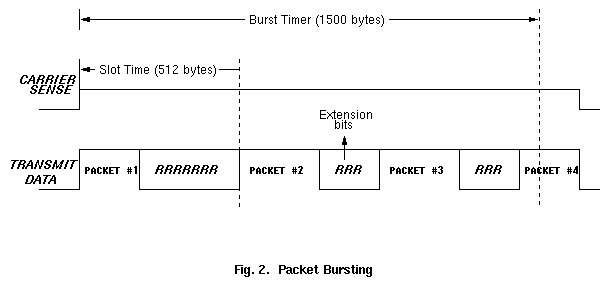Ethernet Slot Time Example
Slot time is a concept in computer networking. It is at least twice the time it takes for an electronic pulse (OSILayer 1 - Physical) to travel the length of the maximum theoretical distance between two nodes. In CSMA/CD networks such as Ethernet, the slot time is an upper limit on the acquisition of the medium, a limit on the length of a packet fragment generated by a collision, and the scheduling quantum for retransmission.[1]
Since a pulse's runtime will never exceed slot time (the maximum theoretical time for a frame to travel a network), the network interface controller, or NIC waits a minimum of slot time before retransmitting after a collision happened, in order to allow any pulse that was initiated at the time that the waiting NIC was requested to send, to reach all other nodes. By allowing the pulse to reach the waiting NIC, a local collision occurs (i.e. while still sending) rather than a late collision occurring (after sending may or may not have ended). By having the collision occur at the NIC (local) and not on the wire (late) CSMA/CD implementation recover the situation by retransmitting later.
The length of the slot time is given by the technical nature of the medium and network card construction, and it is 512 bit times for 10/100 Mbps Ethernet, and 4096 bit times for 1 Gbps Ethernet. It should be noted that the importance of the slot time is only related to collision handling. The scheme adopted by Ethernet uses a random back-off period, where each node selects a random number, multiplies this by the slot time (minimum frame period, 51.2 µS) and waits for this random period before attempting retransmission. The small Inter-Frame Gap (IFG) (e.g., 9.6 microseconds) is also added. The second decision was the duration of the slot time. In Ethernet, a long slot time enables networks to span a long distance but forces the host to use a larger minimum frame size. The compromise was a slot time of 51.2 microseconds, which corresponds to a minimum frame size of 64 bytes. The third decision was the frame format.

Some times for Ethernet slot time include:[2]

| Speed | Slot time[3] | Time Interval |
|---|---|---|
| 10 Mbit/s | 512 bit times | 51.2 microseconds |
| 100 Mbit/s | 512 bit times | 5.12 microseconds |
| 1 Gbit/s[4] | 4096 bit times | 4.096 microseconds |
| 2.5 Gbit/s onward | no half-duplex operation | |


See DIFS for information on 802.11x slot times.
References[edit]
Ethernet Slot Time Example Template
- ^IEEE 802.3 4.2.3.2.3 Collision handling
- ^IEEE 802.3 4.4.2 MAC parameters
- ^Slot time is only applicable to half-duplex transmissions. Since slot time is the time required to wait for the medium to be free from transmissions, there is no time required to wait for full-duplex transmissions. 1 Gbit/s (in practice) and faster (by standard) are full duplex technologies, so slot time is not applicable here.
- ^theoretical, only full-duplex devices exist